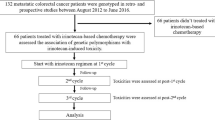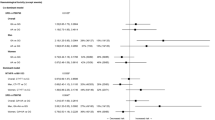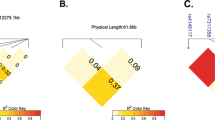Abstract
The purpose of this study was to determine simple genetic factors helpful to tailor 5-FU administration and determine strategy in first-line chemotherapy of advanced colorectal cancer. In 76 patients initially treated by 5-FU, thymidylate synthase, dihydropyrimidine dehydrogenase and methylene tetrahydrofolate reductase germinal polymorphisms, dihydrouracil/uracil plasma ratio and 5-FU plasma clearance were investigated and correlated for tolerance (10.5% grade 3 and 4 toxicity) and efficacy (32.9% objective response rate and 20 months median overall survival time). Toxicity was linked to performance status >2 (P=0.004), low UH2/U ratio, 2846 A>T, IVS 14+1G>A for DPD (P=0.031), and homozygoty C/C for MTHFR 1298 A>C (P=0.0018). The overall survival of the patients with a 3R/3R TS genotype associated with C/C for 677 C>T or A/A for 1298 A>C was statistically shorter (log-rank test P=0.0065). Genetic factors permit the tailoring of 5-FU treatment. They should occupy center stage in future clinical trials for specifically designing treatment for patients with a given biologic feature.
This is a preview of subscription content, access via your institution
Access options
Subscribe to this journal
Receive 6 print issues and online access
$259.00 per year
only $43.17 per issue
Buy this article
- Purchase on Springer Link
- Instant access to full article PDF
Prices may be subject to local taxes which are calculated during checkout








Similar content being viewed by others
References
Advanced Colorectal Cancer Meta-Analysis Project. Modulation of fluorouracil by leucovorin in patients with advanced colorectal cancer: evidence in terms of response rate (see comments). J Clin Oncol 1992; 10: 896–903.
Pinedo HM, Peters GFJ . Fluorouracil: biochemistry and pharmacology. J Clin Oncol 1988; 6: 1653–1664.
Poon MA, O'Connell MJ, Wieand HS, Krook JE, Gerstner JD, Tschetter LK et al. Biochemical modulation of fluorouracil with leucovorin : confirmatory evidence of improved efficacy in advanced colorectal cancer. J Clin Oncol 1991; 9: 1967–1972.
de Gramont A, Bosset JF, Milan C, Rougier P, Bouche O, Etienne PL et al. Randomized trial comparing monthly low-dose leucovorin and fluorouracil bolus with bimonthly high-dose leucovorin and fluorouracil bolus plus continuous infusion for advanced colorectal cancer: a French intergroup study. J Clin Oncol 1997; 15: 808–815.
Marsh S, Collie-Duguid E, Li T, Liu X, McLeod HL . Ethnic variation in the thymidylate synthase enhancer region polymorphism among Caucasian and Asian populations. Genomics 1999; 58: 310–312.
Horie N, Aiba H, Oguro K, Hojo H, Takeishi K . Functional analysis and DNA polymorphism of the tandemly repeated sequences in the 5′-terminal regulatory region of the human gene for thymidylate synthase. Cell Struct Funct 1995; 20: 191–197.
Kawakami K, Salonga D, Park JM, Danenberg KD, Uetake H, Brabender J et al. Different lengths of a polymorphic repeat sequence in the thymidylate synthase gene affect translational efficiency but not its gene expression. Clin Cancer Res 2001; 7: 4096–4101.
Pullarkat ST, Stoehlmacher J, Ghaderi V, Xiong YP, Ingles SA, Sherrod A et al. Thymidylate synthase gene polymorphism determines response and toxicity of 5-FU chemotherapy. Pharmacogenomics J 2001; 1: 65–70.
Etienne MC, Chazal M, Laurent-Puig P, Magne N, Rosty C, Formento JL et al. Prognostic value of tumoral thymidylate synthase and p53 in metastatic colorectal cancer patients receiving fluorouracil chemotherapy: phenotypic and genotypic analyses. J Clin Oncol 2002; 20: 2832–2843.
Iacopetta B, Grieu F, Joseph D, Elsaleh H . A polymorphism in the enhancer region of the thymidylate synthase promoter influences the survival of colorectal cancer patients treated with 5-fluorouracil. Br J Cancer 2001; 85: 827–830.
Popat S, Matakidou A, Houlston R . Thymidylate synthase expression and prognosis in colorectal cancer: a systematic review and meta-analysis. J Clin Oncol 2004; 22: 529–536.
Kawakami K, Watanabe G . Identification and functional analysis of single nucleotide polymorphism in the tandem repeat sequence of thymidylate synthase gene. Cancer Res 2003; 63: 6004–6007.
Mandola MV, Stoehlmacher J, Muller-Weeks S, Cesarone G, Yu MC, Lenz HJ et al. A novel single nucleotide polymorphism within the 5′ tandem repeat polymorphism of the thymidylate synthase gene abolishes USF-1 binding and alters transcriptional activity. Cancer Res 2003; 63: 2898–2904.
Marcuello E, Altes A, Del Rio E, Cesar A, Menoyo A, Baiget M . Single nucleotide polymorphism in the 5′ tandem repeat sequences of thymidylate synthase gene predicts for response to fluorouracil-based chemotherapy in advanced colorectal cancer patients. Int J Cancer 2004; 112: 733–737.
Lu Z, Zhang R, Diasio RB . Dihydropyrimidine dehydrogenase activity in human peripheral blood mononuclear cells and liver: population characteristics newly identified deficient patients, and clinical implication in 5-fluorouracil chemotherapy. Cancer Res 1993; 53: 5433–5438.
Etienne MC, Lagrange JL, Dassonville O, Fleming R, Thyss A, Renee N et al. Population study of dihydropyrimidine in cancer patients. J Clin Oncol 1994; 12: 2248–2253.
Keku T, Millikan R, Worley K, Winkel S, Eaton A, Biscocho L et al. 5,10-Methylenetetrahydrofolate reductase codon 677 and 1298 polymorphisms and colon cancer in African Americans and Whites. Cancer Epidemiology 2002; 11: 1611–1621.
Sohn KJ, Croxford R, Yates Z, Lucock M, Kimi YI . Effect of the methylenetetrahydrofolate reductase C677T polymorphism on chemosensitivity of colon and breast cancer cells to 5-fluorouracil and methotrexate. J Natl Cancer Inst 2004; 96: 134–144.
Cohen V, Panet-Raymond V, Sabbaghian N et al. Methylenetetrahydrofolate reductase polymorphism in advanced colorectal cancer: a novel genomic predictor of clinical response to fluoropyrimidine-based chemotherapy. Clin Cancer Res 2003; 9: 1611–1615.
Etienne MC, Formento JL, Chazal M, Francoual M, Magne N, Formento P et al. Methylenetetrahydrofolate reductase gene polymorphisms and response to fluorouracil-based treatment in advanced colorectal cancer patients. Pharmacogenetics 2004; 14: 1–8.
Jakobsen A, Nielsen JN, Gyldenkerne N, Lindeberg J . Thymidylate synthase and methylenetetrahydrofolate reductase gene polymorphism in normal tissue as predictors of fluorouracil sensitivity. J Clin Oncol 2005; 23: 1365–1369.
Lu JW, Gao CM, Wu JZ, Sun XF, Wang L, Feng JF . Relationship of methylenetetrahydrofolate reductase C677T polymorphism and chemosensitivity to 5-fluorouracil in gastric carcinoma. Chinese J Cancer 2004; 23: 958–962.
Marcuello E, Altes A, Menoyo A, Del Rio E, Baiget M . Methylenetetrahydrofolate reductase gene polymorphisms: genomic predictors of clinical response to fluoropyrimidine-based chemotherapy? Cancer Chemother Pharmacol 2006; 57: 835–840.
Gamelin E, Boisdron-Celle M, Guerin-Meyer V, Delva R, Lortholary A, Genevieve F et al. Correlation between uracil and dihydrouracil plasma ratio, fluorouracil (5-FU) pharmacokinetic parameters, and tolerance in patients with advanced colorectal cancer : a potential interest for predicting 5-FU toxicity and determining optimal 5-FU dosage. J Clin Oncol 1999; 17: 1105–1110.
de Gramont A, Figer A, Seymour M, Homerin M, Hmissi A, Cassidy J et al. Leucovorin and fluorouracil with or without oxaliplatin as first-line treatment in advanced colorectal cancer. J Clin Oncol 2000; 18: 2938–2947.
Douillard JY, Cunningham D, Roth AD, Navarro M, James RD, Karasek P et al. Irinotecan combined with fluorouracil compared with fluorouracil alone as first-line treatment for metastatic colorectal cancer: a multicentre randomised trial. Lancet 2000; 355: 1041–1047.
Seymour MT . Fluorouracil, oxaliplatin and CPT11 use and sequencing (MRC FOCUS): a 2135-patient randomizede trial in advanced colorectal cancer.The UK NCRI colorectal clinical studies group. J Clin Oncol 2005; 23 (suppl 16S): 250S (abstr 3518).
Bouché O, Castaing M, Etienne PL et al. Randomized strategical trial of chemotherapy in metastatic colorectal cancer (FFCD 2000–05): Preliminary results. Am Soc Clin Oncol 2007: 180S (Abstr 4069).
Boisdron-Celle M, Remaud G, Traore S, Poirier AL, Morel A, Gamelin E . 5-Fluororuacil-related severe toxicity: a comparison of different methods for the pretherapeutic detection of dihydropyrimidine dehydrogenase deficiency. Cancer Lett 2007; 249: 271–282.
André T, Boni C, Mounedji-Boudiaf L, Navarro M, Tabernero J, Hickist T et al. Multicenter international study of oxaliplatin/5-fluorouracil/leucovorin in the adjuvant treatment of colon cancer (MOSAIC) investigators. Oxaliplatin, fluorouracil, and leucovorin as adjuvant treatment for colon cancer. N Engl J Med 2004; 350: 2343–2351.
Gamelin E, Boisdron-Celle M . Dose-monitoring of 5-fluorouracil in patients with colorectal or head and neck cancer. Status of the art. Crit Rev Oncol Hematol 1999; 30: 71–79.
Gamelin E, Danquechin-Dorval E, Dumesnil Y, Maillard PJ, Goudier MJ, Burtin PC et al. Relationship between 5-fluorouracil (5-FU) dose intensity and therapeutic response in patients with advanced colorectal cancer receiving infusional therapy containing 5-FU. Cancer 1996; 77: 441–451.
Gamelin E, Boisdron-Celle M, Delva R, Regimbeau C, Cailleux PE, Alleaume C et al. Long-term weekly treatment of colorectal metastatic cancer with fluorouracil and leucovorin: results of a multicentric prospective trial of fluorouracil dosage optimization by pharmacokinetic monitoring in 152 patients. J Clin Oncol 1998; 16: 1470–1478.
Miller SA, Dykes DD, Polesky H . A simple salting out procedure for extracting DNA from human nucleated cells. Nucleic Acids Res 1989; 16: 1915.
Morel A, Boisdron-Celle M, Fey L, Soulie P, Craipeau MC, Traore S et al. Clinical relevance of different dihydropyrimidine dehydrogenase gene single nucleotide polymorphisms on 5-fluorouracil tolerance. Mol Cancer Ther 2006; 5: 2895–2904.
Morel A, Boisdron-Celle M, Fey L, Laine-Cessac P, Gamelin E . Identification of a novel mutation in the dihydropyrimidine dehydrogenase gene in a patient with a lethal outcome following 5-fluorouracil administration and the determination of its frequency in a population of 500 patients with colorectal carcinoma. Clin Biochem 2007; 40: 11–17.
Acknowledgements
We would like to thank the Comité Départemental du Maine et Loire de la Ligue Contre Le Cancer and the Rotary club of Angers for their financial support.
Author information
Authors and Affiliations
Corresponding author
Additional information
Duality of interest
The authors declare that they have no duality of interest.
Rights and permissions
About this article
Cite this article
Capitain, O., Boisdron-Celle, M., Poirier, AL. et al. The influence of fluorouracil outcome parameters on tolerance and efficacy in patients with advanced colorectal cancer. Pharmacogenomics J 8, 256–267 (2008). https://doi.org/10.1038/sj.tpj.6500476
Received:
Revised:
Accepted:
Published:
Issue Date:
DOI: https://doi.org/10.1038/sj.tpj.6500476
Keywords
This article is cited by
-
Severe ileum bleeding following adjuvant capecitabine chemotherapy for locally advanced colon cancer: a case report and review of the literature
World Journal of Surgical Oncology (2021)
-
Prediction of exposure-driven myelotoxicity of continuous infusion 5-fluorouracil by a semi-physiological pharmacokinetic–pharmacodynamic model in gastrointestinal cancer patients
Cancer Chemotherapy and Pharmacology (2020)
-
Toll-like receptor/interleukin-1 domain innate immune signalling pathway genetic variants are candidate predictors for severe gastrointestinal toxicity risk following 5-fluorouracil-based chemotherapy
Cancer Chemotherapy and Pharmacology (2019)
-
Polymorphisms of MTHFR C677T and A1298C associated with survival in patients with colorectal cancer treated with 5-fluorouracil-based chemotherapy
International Journal of Clinical Oncology (2017)
-
Is monitoring of plasma 5-fluorouracil levels in metastatic / advanced colorectal cancer clinically effective? A systematic review
BMC Cancer (2016)



